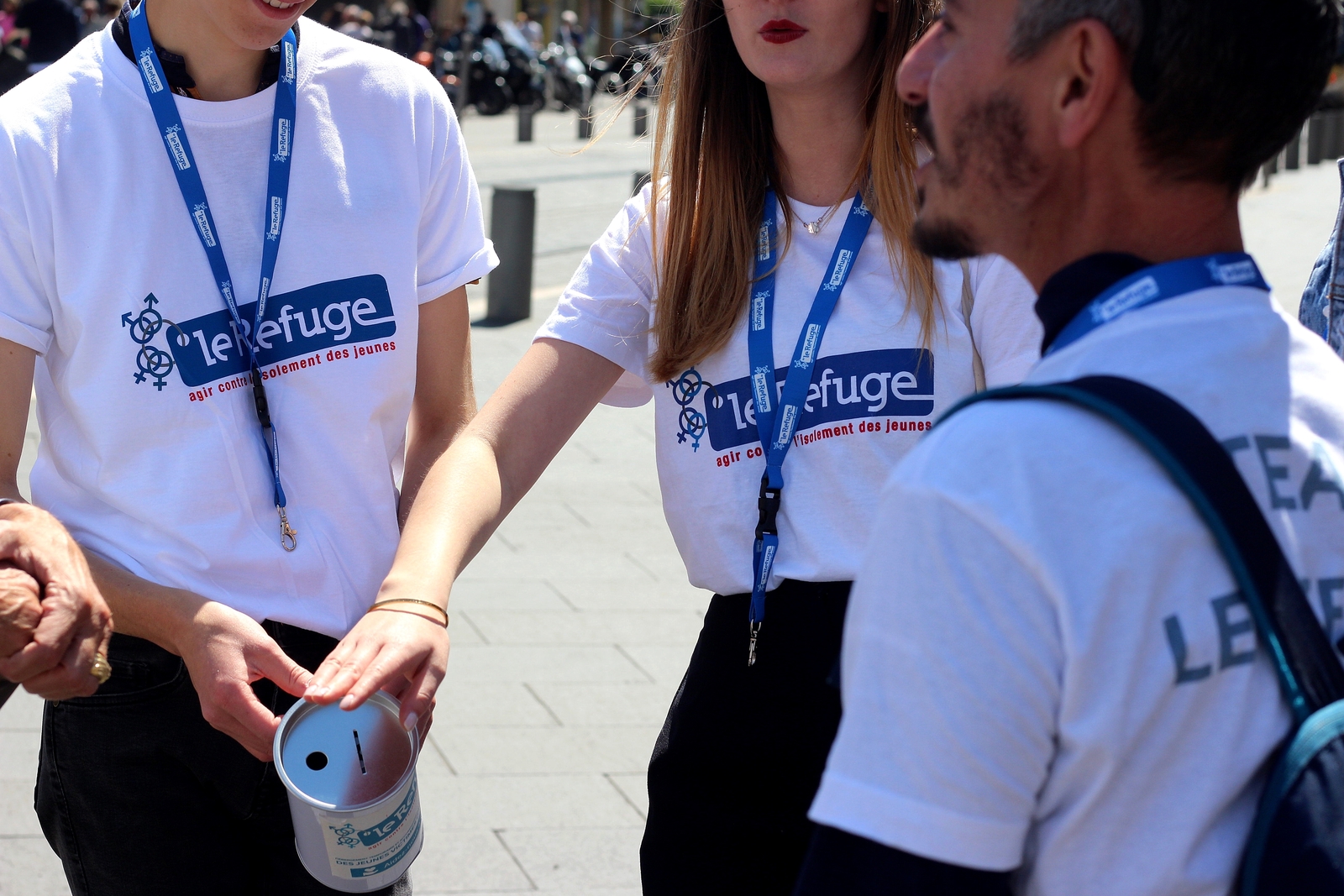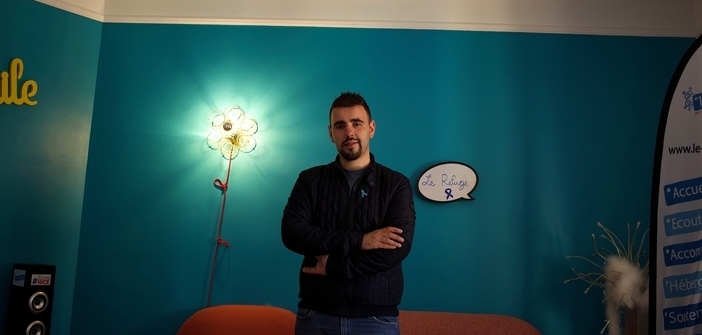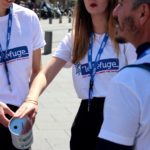On the occasion of the International Day Against Homophobia and Transphobia this Friday, May 17, and the National Refuge Week, we met Rémy Rego, the Southern Region Delegate of this association, which welcomes young people between 18 and 25 years old, rejected from their family home due to their sexual orientation. With him, we reviewed the various missions of the structure and the worrying rise of homophobia and transphobia in France.
Let’s go back to the origins. When was Le Refuge created, and how was the implementation of the Nice branch carried out?
The National Association Le Refuge was created in 2003 in Montpellier, and it is led by Nicolas Noguier, who is the founder. We have been present in Nice since 2015. So, it has been 4 years since the branch was approved by the board of directors of Le Refuge. There was a real need to establish the association on the French Riviera, as we already had many requests. These came from the entire Alpes-Maritimes territory, as in most departments in France. Moreover, we have an emergency line that operates 24/7 at the national level. We centralize all calls and received a large number from the Southern Region.
The first accommodations in 2015 began in a hotel, as we did not have a transition apartment and were still searching. The day after the approval, it was necessary to accommodate two young people. Then, we were lucky enough to have our own apartment, which allowed us to house three young people simultaneously. Initially, we also had a premises on Rue Trachel, but it became too small due to the organization’s expansion. Thanks to the support of the City of Nice, Mayor Christian Estrosi, and Joëlle Martinaux, deputy mayor and vice-president of the CCAS, two new properties were made available to us. Not free of charge, but at moderate rates. Today, we are in this new premises of just over 100 square meters and have a new apartment allowing us to accommodate 5 young people simultaneously.
How is the support for young people organized?
The mission of Le Refuge is to offer socio-educational, legal, medical, and psychological support. We also offer temporary emergency accommodation, which are one-month contracts, renewable for a total duration of six months. This is an average; we can greatly exceed this time, and sometimes it will be shorter. It all depends on the trauma the young person may have experienced before arriving at Le Refuge. It’s also about motivation, as some young people, due to various factors, can progress faster than others in job searches, etc.
There is a lot of listening involved. Our first wish when the young person arrives at Le Refuge is that they can regain self-confidence and come out of isolation. This involves drop-in times. For example, on Monday mornings, we organize a breakfast with them to find out how their weekend went, if they need assistance during the week with any particular procedures. We also have night drop-ins, which allow volunteers and teams to ensure everything is going well at the transition apartments. We visit on Monday, Tuesday, and Thursday evenings from 10 p.m. to 11 p.m. It’s often a privileged moment with the young people, for discussion. At night, they are more likely to confide, and the exchange is facilitated. These times are extremely important. They have an internal regulation to which they adhere, and the commitments are mutual.
Le Refuge is not just a hotel; it is a comprehensive care with tailored, personalized support. This is our specificity. The recognition we benefit from today comes from the adaptation of the care to each young person. They are not just case numbers; each one is unique. They have all our attention. The spirit of Le Refuge is to be a second family. They feel safe and secure.

Upon arriving at the premises, what state of mind is a young person in after being driven out of the family home?
In 90% of cases, they are broken. They may be shattered mentally and physically, as they have often spent several days, even weeks, outside. They are in psychological distress, not being prepared to experience a situation like the one they endured with their family or close ones. That is, being rejected without explanations other than insults and, sometimes, beatings. Significant physical violence occurs regularly. They arrive here a bit frightened, and our role is to ensure they quickly regain confidence in themselves and others. Otherwise, we cannot move forward. From the first minutes, it is crucial to have special attention and ensure they have no suicidal thoughts. We have two clinical psychologists who volunteer weekly. We offer an initial mandatory appointment to assess their psychological shock state. Further sessions may follow based on the degree of trauma experienced.
Do you sometimes contact the family of these young people?
Very rarely. We don’t do it if the young person doesn’t want it, otherwise, we could put them in danger. Most of the time, they have fled or been kicked out by parents, who may have committed physical assaults and could potentially do so again. This is why the young person usually won’t tell us where they live, so their parents don’t know they are at Le Refuge. We may also have cases of young people who come to the premises due to harassment suffered in a school environment, not within the family sphere. They equally need moral and psychological support. Despite the receptivity of their parents, they may feel bad within themselves.
According to the recent IFOP report, many homosexual couples adopt an “invisibility strategy” in the public sphere to avoid homophobic remarks or assaults. Do we find this in the family sphere?
Homophobia within the family sphere can last several months or even several years. Several factors are involved, such as culture, religion, or the social environment. A young person can confide rather quickly about their homosexuality if they think their parents are open to the topic. When one is homosexual or trans, they sense a difference because society pushes us to think about this difference. The homosexual or transgender population represents about 10% and remains a minority. Even though I don’t like the term, heterosexuality remains a synonym for normality. The young person senses this and will try to discern if their parents accept or not homosexuality in the situations they observe. For instance, in front of a TV series or a show, a violent reaction from close ones can be heard sometimes, with a devastating effect on the young person. At school, they will exclude themselves upon hearing homophobic remarks during recess or class. This can sometimes lead to a suicide attempt, which is 13 times higher than among straight young people. It’s difficult to know if homophobia is more ingrained in the family, but it is certainly very present.
In France, an increase in offenses against homosexual or trans people is observed. Do you notice an increase in rejection?
We do notice it. Each year, we see an increase in requests for support. In the year 2018, we had 25% more requests compared to the previous year. Family rejection remains very present, perhaps even more so than before. There are several reasons for this situation. Since marriage for all, young people express themselves more easily, but they also face dangers more often. Whether within the family, outside, or at school. On the other hand, many radical movements today hold views that seem to me, forgive the expression, “disgusting.”



